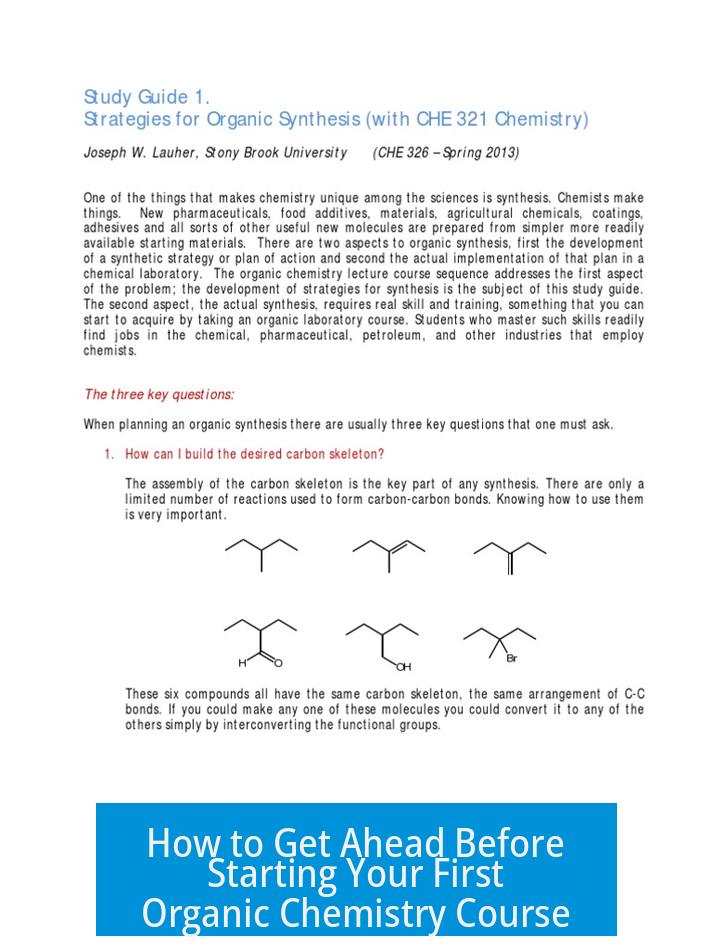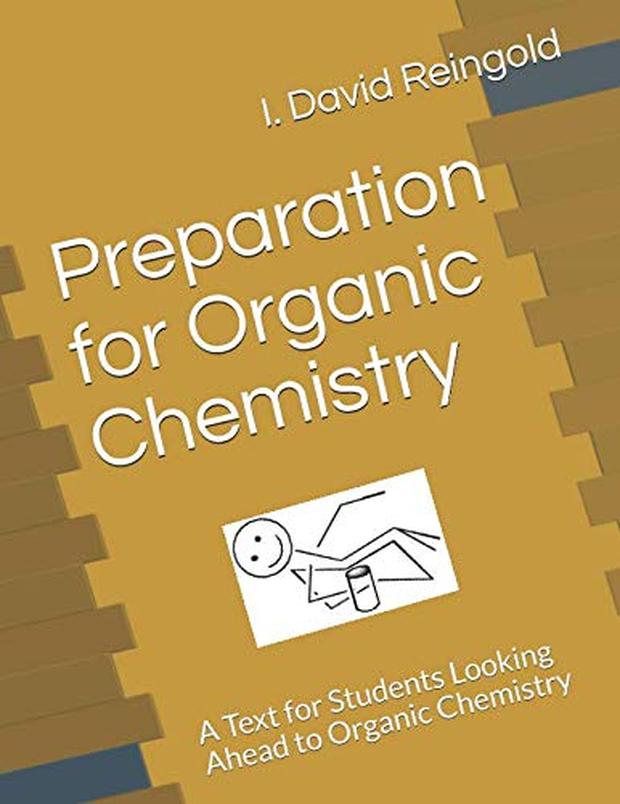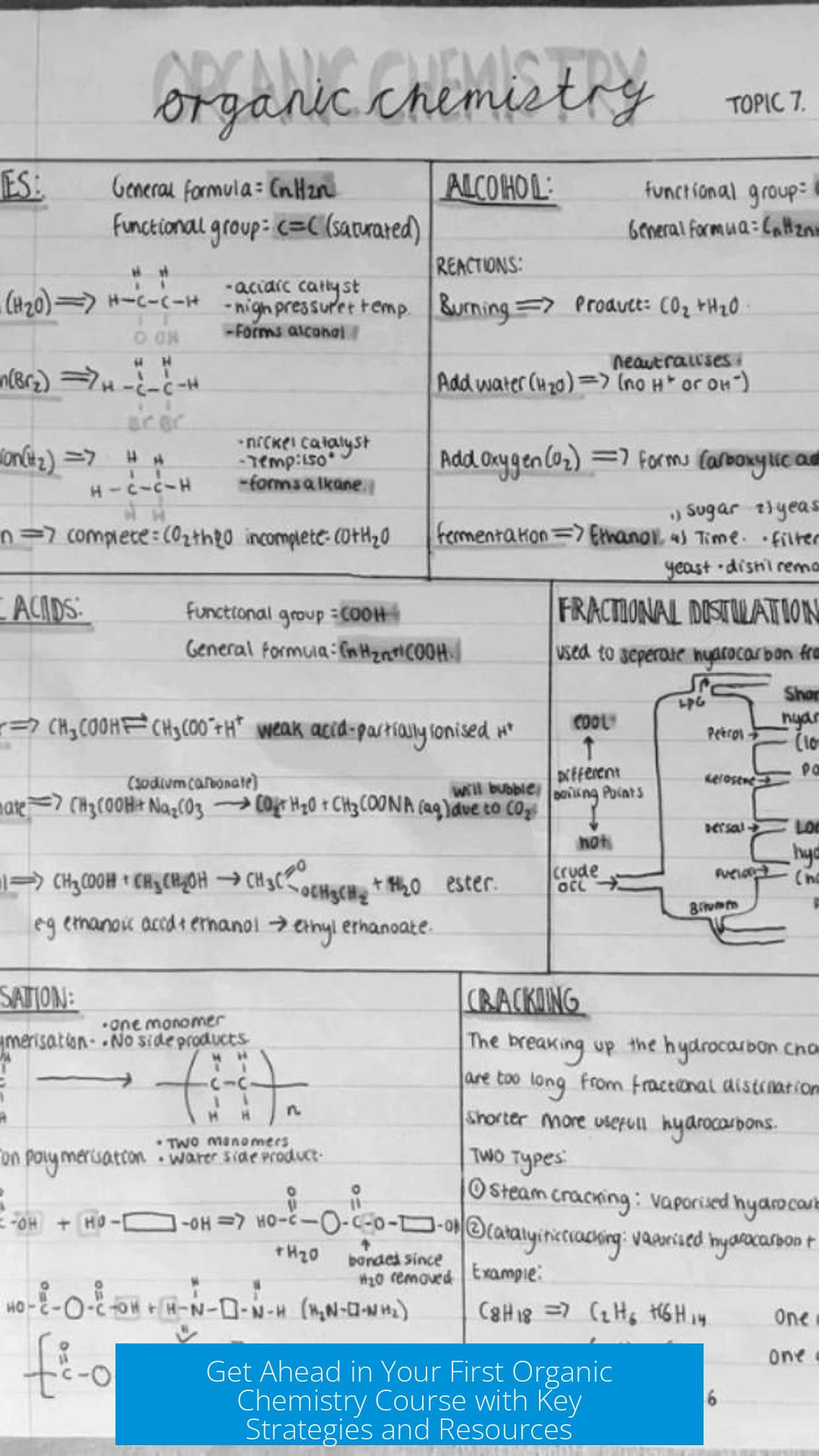How to Get Ahead Before Starting Your First Organic Chemistry Course

Preparing ahead for your first organic chemistry course boosts understanding and confidence. Incorporate a mix of study resources, focused key topics, practical tools, and effective study habits to build a strong foundation and ease the transition. This article details specific steps to get a head start and make the learning process smoother.
1. Utilize Quality Study Resources

a. Textbooks and Solution Manuals
Access well-regarded textbooks before classes begin. David Klein’s third edition of Organic Chemistry offers detailed explanations and practice problems. The free online availability of its solution manual allows self-checking exercises and reinforces learning.

Clayden, Greeves, Warren: Organic Chemistry is another excellent resource. Reading the introductory chapters familiarizes students with the language and scope of organic chemistry. If possible, use the textbook provided by your institution and study the first chapters to get accustomed to the class material.
b. Supplementary Books
Another helpful title is Organic Chemistry as a Second Language, which breaks down fundamental concepts like functional groups. Mastery of such basics benefits related fields like biochemistry and strengthens the core understanding necessary for organic chemistry.
c. Online Lectures and Videos
- Watch lectures by Professor Dave on YouTube, which simplify foundational ideas.
- Explore the Organic Chemistry Tutor channel for problem-solving strategies.
- Review free online courses, such as Chad Stephens’ playlists, for comprehensive coverage.
- Use video resources to complement textbook study and visualize complex reactions.
2. Focus on Key Topics and Effective Note-Making
a. Reaction Mechanisms
Prepare concise notes on common reaction mechanisms like SN1, SN2, E1, and E2. Understanding these will clarify how molecules interact and transform. Maintain a master sheet summarizing mechanisms, strong and weak nucleophiles, and electrophiles encountered throughout the course.
b. Lewis Acids and Bases
Develop a solid understanding of Lewis acid-base theory, which explains electron pair acceptance and donation. This concept underpins many reaction behaviors and is essential for grasping organic reactivity.
c. Functional Groups
Identify and memorize key functional groups before classes start. Recognizing these groups is crucial because they define molecule behavior and guide reaction predictions.
d. Orbital Theory and Energy Concepts
Study the basics of atomic and molecular orbitals. Learn orbital hybridization, shapes, and energy levels, as these determine molecular geometry and reactivity. Understanding why nucleophilic electrons have high energy or why electrophilic sites are accessible provides insight into reaction mechanisms.
e. Acids, Bases, and Stability
Relate acidity/basicity to pKa and pH. Understand factors that stabilize ions, such as resonance and inductive effects. These principles assist in predicting reaction outcomes and intermediates.
f. Kinetics and Thermodynamics
Review kinetic and thermodynamic principles to grasp reaction rates and equilibria. This knowledge aids in analyzing why some reactions occur readily while others do not.
g. Nomenclature
Become comfortable with naming organic molecules. This skill is pivotal in communication and understanding assigned problems.
h. General Approach to Reactions
Do not just memorize isolated reactions. Seek to understand underlying traits linking them, such as the behavior of nucleophiles and electrophiles. Focus on nucleophilic substitution and elimination reactions, along with some carbonyl chemistry, to identify reaction patterns.
3. Use Practical Tools
a. Molecular Modelling Kit
Purchase a small molecular model kit. Manipulating three-dimensional models enhances comprehension of stereochemistry and molecular shapes. These kits are affordable and valuable for visual learners.
4. Develop Effective Study Habits and Mindset
a. Prioritize Practice and Understanding Over Memorization
Focus on understanding why reactions occur rather than rote memorization. Understanding reduces cognitive load during exams and enables problem-solving for unfamiliar questions. Stay current with lectures and tutorials, and practice extensively.
b. Build a Strong Foundation
Refine basic concepts before moving to advanced topics. Students who fail often grasp individual facts but lack an integrated understanding of their significance. A solid foundation ensures smoother future courses and better retention.
c. Adopt a Positive Perspective on Organic Chemistry
Many beginners find organic chemistry daunting due to its reputation. However, turning the right mindset towards the subject reveals its systematic and logical nature, often making it more enjoyable and less intimidating.
5. Seek Additional Support
a. Engage with Instructors and Peers
Don’t hesitate to ask instructors for clarification or assistance. Join study groups or online forums where you can discuss challenging topics. Support networks improve motivation and comprehension.
Summary of Key Takeaways
- Access comprehensive textbooks and online video lectures to build early familiarity.
- Focus on fundamental topics: reaction mechanisms, functional groups, acids/bases, and orbitals.
- Create concise notes and master sheets for quick reference.
- Use molecular models to visualize structures and stereochemistry.
- Practice problem-solving consistently rather than memorizing reactions.
- Stay current with coursework and seek help when needed.
- Adopt a positive and proactive approach toward learning the subject.
How Can I Get Ahead Before Starting My First Organic Chemistry Course?
Getting ahead before your very first organic chemistry class starts is totally doable—and smarter than cramming at 2 a.m. the night before. The best approach? Build a strong foundation, engage with quality resources, and embrace the mindset that understanding beats memorization every time. Let’s unpack exactly how to get that head start.
Organic chemistry’s reputation for being tough makes many nervous. But what if you eased into it and learned to actually enjoy the material? Yes, it’s possible. The secret lies in preparation and perspective.
Start With the Right Study Resources
First things first: grab the textbooks and materials. Many students rave about downloading David Klein’s third edition organic chemistry textbook and its solution manual online for free. This approach lets you work through problems well in advance—solving exercises is the best way to build confidence.
If you prefer something a bit meatier, Clayden, Greeves, and Warren’s “Organic Chemistry” is a solid choice. Reading the introductory chapters before class gives a clearer picture of what’s ahead. And if you can find the actual textbook your school uses? Bonus! Skimming through the first chapters early helps you familiarize yourself with the course’s flow.
Don’t ignore supplementary books. Organic Chemistry as a Second Language works wonders at breaking down function groups and fundamental concepts, which you’ll see repeatedly in biochemistry and other classes.
Feeling stuck on a concept? Turn to YouTube—Professor Dave’s organic chemistry playlist earns high praise for its clear, digestible explanations. Alongside, check out the Organic Chemistry Tutor channel and Chad Stephens’ online course videos. These resources cater to different learning styles and make dense concepts surprisingly friendly.
Focus on Key Topics by Making Smart Notes
Okay, you have books and videos. Now what? Focus your note-taking on core topics validated across the board by successful students:
- Reaction mechanisms: Learn your SN1, SN2, E1, and E2 inside out. Create a master sheet listing these reactions alongside strong and weak nucleophiles and electrophiles you encounter. This cheat sheet is a gold mine during tests.
- Lewis acids and bases: Understand them deeply. Why? Because acids and bases form the foundation for many reaction pathways.
- Functional groups: You’ll meet these everywhere. Master them early, and later topics become easier. They’re not only essential in organic but crucial in biochemistry too.
- Orbital theory and energy concepts: Think beyond just memorizing names. Grasp how orbitals hybridize, interact, and affect molecular geometry in 3D. Internalize why high-energy nucleophilic electron pairs are reactive or why electrophilic sites have accessible low-energy orbitals. This is science’s core storytelling.
- Acids, bases, and stability: Know the relationship between pKa and pH, and what makes ions stable or unstable. This insight shapes your understanding of reaction conditions.
- Kinetics and thermodynamics: These topics clarify which reactions happen fast or slow, and which are energetically favorable. This knowledge enriches your grasp of reaction mechanisms.
- Nomenclature: Early-bird mastery here pays off. The language of organic chemistry is built on naming, and you’ll use it constantly.
Equip Yourself With Practical Tools
Studying organic chemistry means handling three-dimensional structures. A small molecular modeling kit (which you can snag for about $20) is a game changer. This hands-on tool helps visualize stereochemistry, making tricky concepts tangible rather than abstract.
Adopt Effective Study Habits and the Right Mindset
Memorizing endless reactions won’t cut it. Instead, aim to understand why reactions proceed the way they do. This reduces the memory load and enhances exam performance. Keep pace with lectures and tutorials—falling behind is a slippery slope.
Practice is king. Repeatedly solving problems isn’t just busywork; it trains your brain to think like an organic chemist. Also, never cram. Organic chemistry rewards consistent study patterns, so plan your schedule accordingly.
Remember, fundamentals don’t change between courses. If you invest time refining the basics now, later courses become manageable. Some students struggle not because the material is inherently hard, but because they learn topics in isolation without connecting them into the bigger picture. Develop a holistic understanding.
Personally, many find organic chemistry far less scary once they change their attitude. Approaching it as a puzzle rather than a monster to slay makes it much more enjoyable—and often easier.
Seek Additional Support and Build a Learning Community
Don’t shy away from asking for help. Whether it’s your instructor, classmates, or online forums, reach out. Some instructors even offer to guide students before or during the course. Engaging with a community reinforces your learning and provides practical tips.
So, What’s the Bottom Line?
To get ahead before your first organic chemistry course, grab free or school-specific textbooks like David Klein’s third edition and Clayden’s text. Supplement with accessible books such as Organic Chemistry as a Second Language to grasp functional groups easily. Dive into YouTube tutorials from Professor Dave and the Organic Chemistry Tutor for foundational videos. Make concise notes on reaction mechanisms, Lewis acids and bases, orbital theory, kinetics, and nomenclature. Get a molecular modeling kit to visualize complex 3D structures.
Adopt consistent study habits focused on understanding, not memorization. Stay on top of your tutorials, practice relentlessly, and build a strong conceptual foundation early. And remember, organic chemistry is more manageable and enjoyable than its dreadful reputation suggests.
Now, how do you plan to start? Will you download Klein’s textbook tonight? Or maybe build that molecular model this weekend? The first step is often the hardest, but it’s also the most rewarding.





Leave a Comment